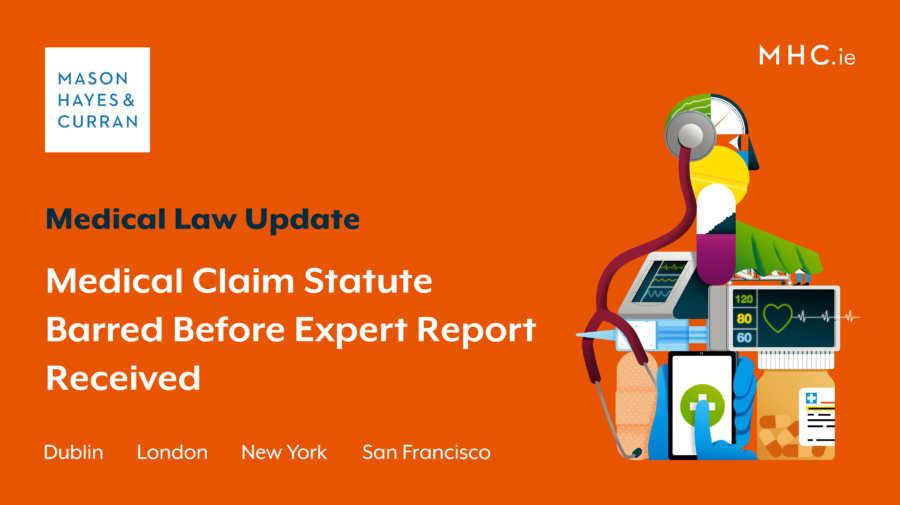Medical Claim Statute Barred Before Expert Report Received

A recent High Court judgment restated the law concerning the date of knowledge under the Statute of Limitations Act. It highlights that waiting on an expert report may mean a claim becoming statute barred. Mark McCabe, Medical Law partner, reviews how this decision may impact parties in other cases.
A recent judgment in a case before the High Court has reaffirmed that “a court has to consider what a plaintiff did or did not know on a given date”[1] in deciding whether a case should be statute barred. Recent caselaw provided that parties were allowed to advance their proceedings by relying on the date of expert reports as their “date of knowledge”.
However, Monaghan v Molony[2] indicates that this is not always the case. Here, the High Court found that Mr Monaghan had the knowledge he needed to maintain the proceedings before securing an expert report. It also found that the content of the expert report was materially the same as the information already available to him.
Background
Mr Monaghan sustained an injury in May 2015 to a major chest muscle. He attended his GP on three occasions before being referred for surgical intervention. He underwent a direct repair operation in January 2016 which was unsuccessful. However, an allograft procedure had to be carried out which allegedly caused significant injuries.
Importantly, in October 2015 Mr Monaghan was advised by a treating orthopaedic surgeon that a delay in referring him for surgery was likely to cause the direct repair surgery to fail.
Mr Monaghan issued proceedings outside of the normal two-year statutory timeframe in May 2018, based on an expert report from January 2017. This report essentially stated that the GP’s delay in diagnosis and subsequent referral for surgery caused the failure of the direct repair surgery and the need for an allograft procedure to be carried out.
The GP argued Mr Monaghan’s claim was statute barred as proceedings should have issued within two years of his date of knowledge. The GP argued that his date of knowledge was long before he issued proceedings[3]. This knowledge involved:
- When he knew the identity of the defendant
- That he suffered an injury
- That his injury was significant, and
- That it was caused by the GP’s inaction
Arguments put forward
Mr Monaghan’s contentions included that his date of knowledge ran from the date of his 2017 report or from a subsequent expert report he obtained.
The GP relied on correspondence between Mr Monaghan and his former lawyers and with the Medical Council. This highlighted that Mr. Monaghan:
- Was informed by an orthopaedic surgeon in October 2015 that significant injury was caused by the delay in his operation
- Intended to take legal action in November 2015 as he knew that the delay impacted on the direct repair surgery
- Gave them an account of why his injury from his surgery in 2016 was due to the delay, and
- Highlighted concerns he raised with his former lawyers about his claim becoming statute barred
Court decision
Ultimately, the High Court found that Mr Monaghan’s expert reports did not provide him with a new date of knowledge. This was because the key information was already available to him when he attended the orthopaedic surgeon in October 2015.
In addition, the correspondence with the Medical Council and Mr Monaghan’s former lawyers proved that he knew of his injury, the time constraints around issuing proceedings, and he didn’t need expert advice to know this. All of these factors meant his claim was statute barred.
Conclusion
The case highlights that legal practitioners must exercise caution as an injured patient may not be able to rely on the date of their expert report to avoid their claim being statute barred. While it appears that gaining access to correspondence involving a party’s former lawyer and the Medical Council is somewhat unique in this case, it also highlights the importance of thoroughly investigating the date of knowledge issue. Lawyers defending these claims should diligently interrogate the facts including seeking access to ancillary information which might suggest an injured patient held the requisite knowledge prior to securing their expert opinion.
For more information, contact a member of our Medical Law team.
The content of this article is provided for information purposes only and does not constitute legal or other advice.
[1] O’Sullivan v Ireland [2020] I IR 414 Finlay Geoghegan J. at para 104
[2] Monaghan v Molony [2024] IEHC 284
[3] Section 2 Statute of Limitations (Amendment) Act 1991
Share this:



